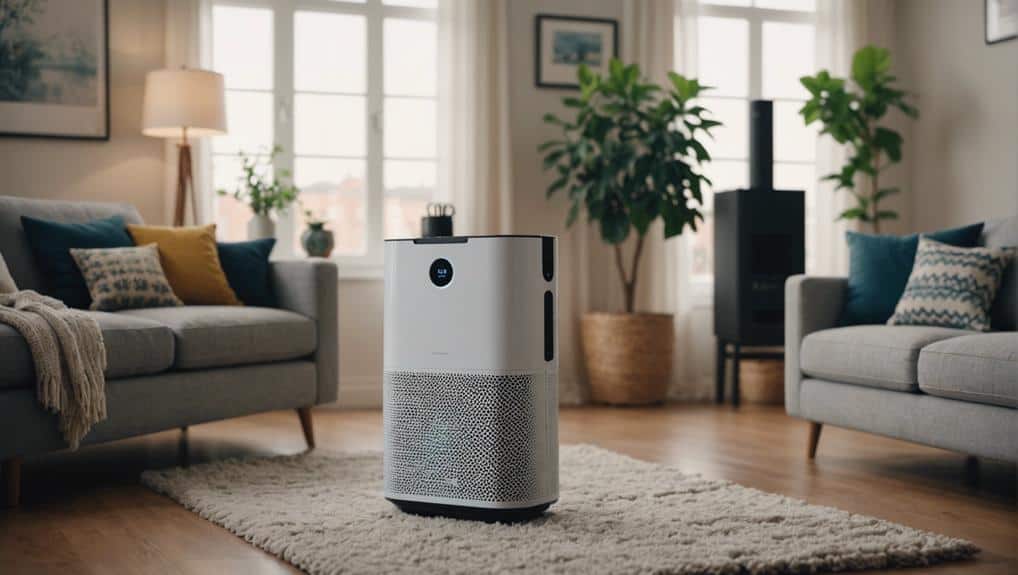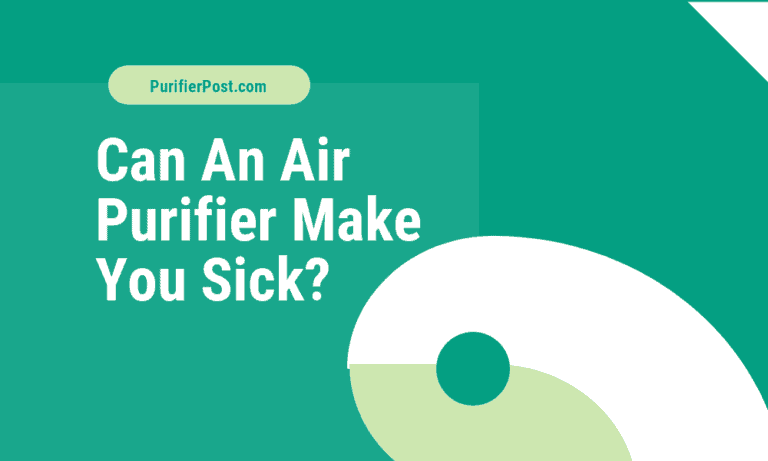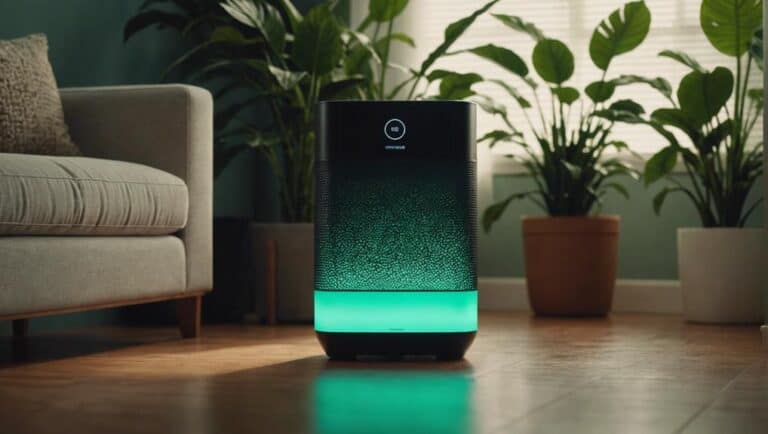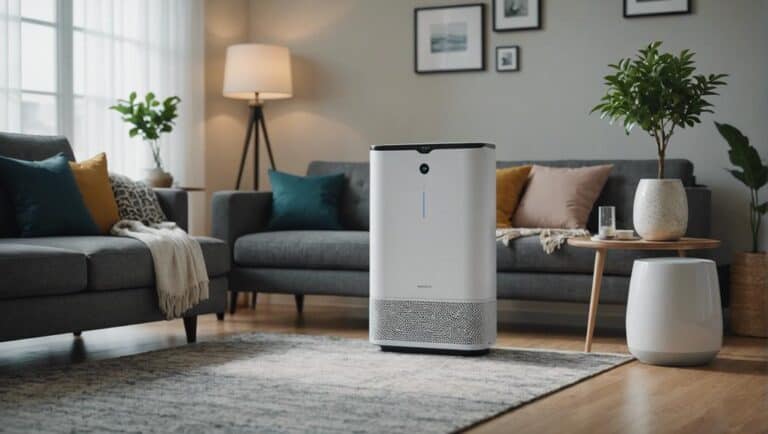Improve Indoor Air Quality With 5 Air Purifier Benefits
When it comes to creating a healthier indoor environment, air purifiers offer a range of benefits that can make a significant difference in your daily life. From removing allergens and pollutants to combating viruses and harmful chemicals, these devices play an essential role in improving indoor air quality. But that's just the beginning; there are five key advantages that air purifiers bring to the table, each contributing to a cleaner and fresher atmosphere inside your home.
Airborne Particulates Removal
We regularly rely on air purifiers to effectively remove various airborne particulates, such as dust, pollen, and pet dander, using advanced HEPA filters. These HEPA filters are designed to capture particles as small as 0.3 microns, ensuring that even the tiniest allergens are eliminated from the air we breathe. High-quality air purifiers go a step further by efficiently trapping dust particles, allergens, and smoke particles ranging from 0.1 to 2.5 microns. By incorporating multiple filtration layers, these air purifiers can effectively remove fine particles that trigger allergies and attract dust mites, thereby improving indoor air quality significantly.
Pet dander, a common allergen measuring around 2.5 microns, is no match for the effectiveness of HEPA filters in air purifiers. These filters work tirelessly to eliminate pet dander, ensuring that our living spaces remain free from this potential allergen. Additionally, advanced air purifiers are capable of capturing smoke particles as small as 0.1 microns, further enhancing the quality of the air we breathe.
Allergy and Asthma Symptom Reduction
Reducing allergy and asthma symptoms is an important benefit of utilizing air purifiers equipped with HEPA filters. Here are three key points to keep in mind:
- HEPA filters in air purifiers effectively capture allergens: Pollen, dust mites, and pet dander are common triggers for allergy symptoms. By removing these airborne allergens, HEPA filters help in reducing allergy symptoms significantly.
- Removal of asthma triggers: HEPA filters can also eliminate asthma triggers like mold spores and dust particles. This elimination is vital for individuals with asthma as it can lead to fewer asthma attacks and improved lung function.
- Decreased need for allergy medications: By creating a cleaner indoor environment with up to 99.97% efficiency in removing airborne allergens, air purifiers with HEPA filters can potentially reduce the reliance on allergy medications and provide relief for those suffering from allergies and asthma.
Incorporating air purifiers with HEPA filters into your indoor environment can lead to cleaner air and alleviate allergy and asthma symptoms, giving you more control over your health.
Airborne Virus Exposure Reduction

To reduce exposure to airborne viruses, air purifiers can effectively capture and remove harmful bacteria and viruses from indoor air. High-efficiency air purifiers equipped with UV light technology can filter out airborne particles carrying viruses and inactivate organic pollutants, thereby reducing the risk of viral infections.
By using air purifiers, we can minimize the transmission of viruses like colds, flu, and even COVID-19, leading to a reduction in viral spread within indoor spaces. These devices play an important role in lowering the risk of viral infections, although complete elimination of the risk can't be guaranteed.
With air purifiers actively removing bacteria and viruses from the air, individuals can experience a significant decrease in airborne virus exposure, creating a healthier indoor environment and contributing to overall well-being. Embracing the use of air purifiers is a proactive step towards reducing the potential health impacts associated with viral infections.
Mold Growth Control
High humidity and poor ventilation can create ideal conditions for mold growth in indoor environments. To effectively control mold growth and improve indoor air quality, consider the following:
- HEPA Filters: HEPA filters in air purifiers are highly efficient at capturing mold spores released by mold, preventing them from circulating through the air and settling on surfaces.
- Moisture Levels: Built-in dehumidifiers in air purifiers help regulate moisture levels, creating an environment less conducive to mold growth.
- Prevent Mold: By using air purifiers with HEPA filters and dehumidifiers, you can actively prevent the spread of mold spores, reducing the associated health risks.
Air purifiers equipped with HEPA filters play an essential role in controlling mold growth in indoor environments. By addressing moisture levels and capturing mold spores, these devices provide a proactive approach to maintaining clean and healthy indoor air quality.
Harmful Chemicals Elimination
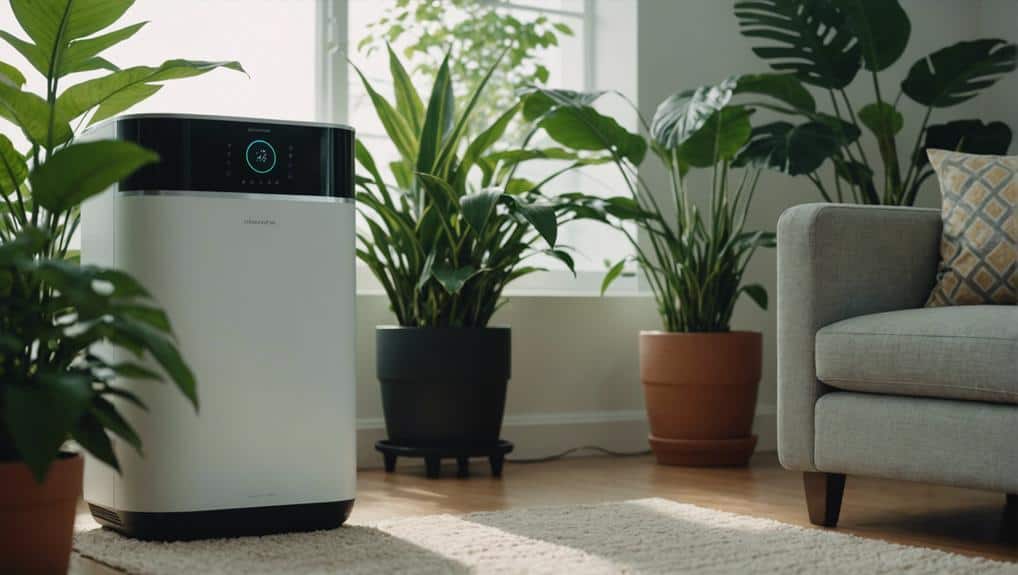
Indoor air quality can be greatly enhanced by utilizing air purifiers to effectively eliminate harmful chemicals present in household products and outdoor sources. Air purifiers play a vital role in removing volatile organic compounds (VOCs) and other chemicals and vapors that can negatively impact the indoor environment.
These pollutants, originating from paints, aerosol sprays, cleaning products, as well as outdoor sources like vehicle emissions and wildfire smoke, can be efficiently eliminated by high-quality air purifiers.
Conclusion
In summary, air purifiers offer a range of benefits that greatly improve indoor air quality. From removing airborne particulates to reducing allergy symptoms and controlling mold growth, these devices play an important role in creating a healthier living environment.
By eliminating harmful bacteria, viruses, and chemicals, air purifiers enhance overall air quality and promote better respiratory health. Investing in an air purifier is a simple and effective way to guarantee clean and fresh indoor air for you and your loved ones.
